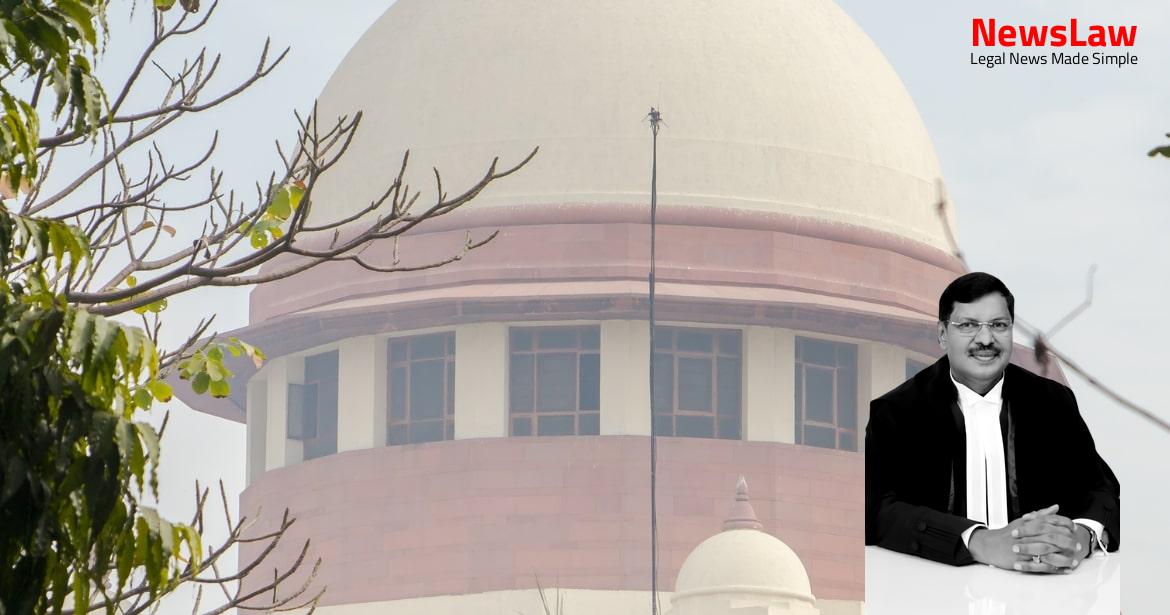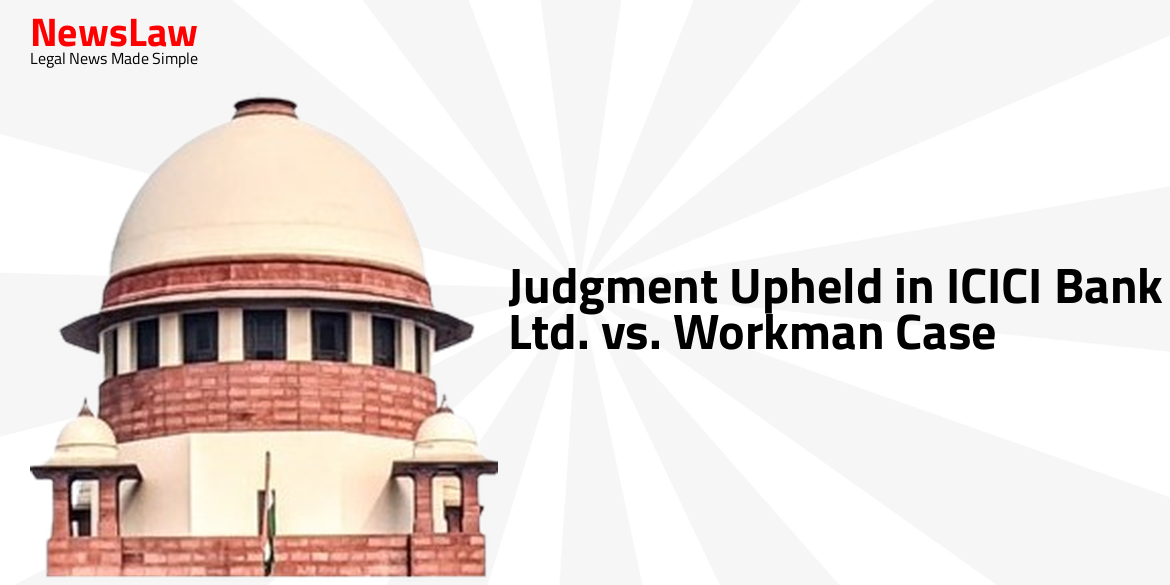The Supreme Court of India recently issued a crucial judgment on the termination of liquidation proceedings in the case involving The Goa State Cooperative Bank and the Legal Representatives of the Society. The decision has far-reaching implications on the recovery of loan amounts and the future of the proceedings. Stay tuned to learn more about this landmark ruling.
Facts
- The Goa, Daman and Diu Cooperative Fisheries Federation Limited, hereinafter referred to as ‘the Society’, was registered under the Maharashtra Co-operative Societies Act, 1960, with the objective of promoting fisheries and improving the socio-economic condition of fishermen.
- Loans totaling Rs.316 lacs were disbursed between 1974 and 1980 to members of the Society for the procurement of mechanized fishing boats/trawlers.
- Multiple instances of serious irregularities were committed by the Board of Directors while granting loans to members.
- Liquidation proceedings were initiated by the Registrar of Cooperative Societies, leading to the appointment of multiple Liquidators over the years.
- Despite various legal proceedings and appeals, recovery of dues remained incomplete and led to the filing of Misfeasance Case No.4/1/80.
- The High Court of Bombay at Goa, in response to Writ Petition No.358 of 2001, terminated the winding up proceedings of the Society with retrospective effect from 24.1.1993.
- The appointment of the Goa State Cooperative Bank as Liquidator aimed at facilitating the swift recovery of loans from defaulting members.
- Numerous recovery cases were filed against defaulting members, with appeals pending before the Cooperative Tribunal.
- The question of the closure of recovery proceedings against members post the liquidation period under Section 109 of the Act is a key issue in the case.
- High Court judgment dated 29.11.2006 stated that winding up proceedings must close within six years from the Liquidator’s control of all property.
- Registrar can only extend period up to 1 year at a time and 4 years in total per Section 109(1) of the Act.
- After three years from Liquidator’s control, liquidation proceedings are deemed terminated unless extended.
- High Court ruled that Registrar must close winding up as 7 years have passed with no provision to continue.
Also Read: Urs Family Property Dispute: Supreme Court Decree
Arguments
- Mr. Arvind Sharma, representing the appellant-Bank, argues that the High Court made a legal error in granting the writ petition despite the expiration of the period set under Section 109 of the Act.
- He asserts that the proceedings for recovering the loan amount from the members should be allowed to continue.
- Ms. Shobha Gupta, counsel for LRs of the respondent, argued that there is no basis for challenging the impugned judgment.
- She referred to the Act’s scheme to support her argument.
Also Read: Promissory Estoppel and Public Interest: Union of India vs. M/s Dharampal Satyapal Ltd.
Analysis
- The winding up of the cooperative society was ordered by the Registrar of Cooperative Societies due to irregularities in loan sanction and benami transactions.
- Liquidator appointed as Society failed in loan disbursement and recovery objectives.
- Registrar can extend the liquidation period, not exceeding a total of 10 years.
- Liability of members for loans does not end on termination of liquidation.
- Proceedings for recovery against defaulting members continue even after liquidation.
- Registrar empowered to terminate liquidation proceedings on receipt of final report from the liquidator.
- Court stay orders should not prejudice recovery proceedings against defaulting members.
- Failure to complete liquidation work can extend the liquidation period beyond initial 6 years.
- Members’ liability for debts taken does not end with termination of liquidation.
- Public money recovery from defaulting members is crucial to prevent financial loss.
- Section 105 grants powers to the Liquidator appointed under Section 103, subject to supervision of the Registrar.
- The Liquidator can institute and defend legal proceedings on behalf of the society, carry on its business, and sell its property.
- Section 106 states that the order of winding up is effective for all creditors and ‘contributories’ of the society.
- Any fresh dispute against the society is barred once a winding up order becomes effective.
- Registrar can entertain disputes by or against the society on his own motion.
- Civil courts are barred from taking cognizance of any matter related to the winding up of a society under the Act.
- Section 108 mandates the auditing of the Liquidator’s accounts and submission of audited summaries to every contributory.
- Section 109 provides for the termination of liquidation proceedings, with a time limit of six years unless extended by the Registrar.
- The Liquidator’s final report must include details of how the winding up was conducted and suggest how any surplus funds should be utilized.
- The Registrar can terminate the liquidation proceedings upon receipt of the Liquidator’s final report.
- If the work of liquidation is not completed within ten years, the Registrar can extend the timeline and direct the Liquidator to complete the process.
- The Liquidator has control over the society’s assets, and the Registrar can remove and replace the Liquidator at will.
- No person should suffer from the act of court and unfair advantage gained by a party through interim orders must be neutralized.
- Members who have obtained stay in appeal or on recovery proceedings cannot take advantage of the fact that the liquidator’s period under the Act is over.
- When proceedings for recovery are pending against members and the society has taken loans from banks, the recovered money should go to the creditors like the bank for the benefit of the public.
- Courts should prevent a litigant from perpetuating illegality by abusing the legal process.
- Restitution principle is essential to ensure justice and prevent undeserved gains through abuse of the legal system.
- Any unfair advantage gained due to interim orders must be neutralized at the final decision to achieve complete justice.
- Restitution is a remedy against unjust enrichment, and courts should prevent litigants from using legal proceedings to unjustly benefit themselves.
- In the case discussed, the bank itself is a prime lender and liquidator, further emphasizing the need for restitution and prevention of abuse of legal processes.
- Liquidation of Society or end of liquidation period does not wipe off liability of members for loans.
- Bank can continue recovery proceedings and make recoveries from defaulting members.
- Disbursement of loans in arbitrary manner and failure to recover led to winding up of Society.
- Proceedings cannot come to an end.
Also Read: Jurisdictional Interpretation in Kamlesh Babu v. Lajpat Rai Sharma
Decision
- The appeal is allowed to the extent mentioned.
- The decision of the High Court is overturned.
- The Liquidator cannot continue post proceedings.
- The appellant Bank can proceed with pending proceedings.
- Registrar to issue notices to creditors and relevant parties.
- Proceedings can continue through court/tribunals/recovery officers.
Case Title: THE GOA STATE COOPERATIVE BANK LTD. Vs. SHRI KRISHNA NATH A. (DEAD) THROUGH LRS.
Case Number: C.A. No.-010596-010596 / 2010



